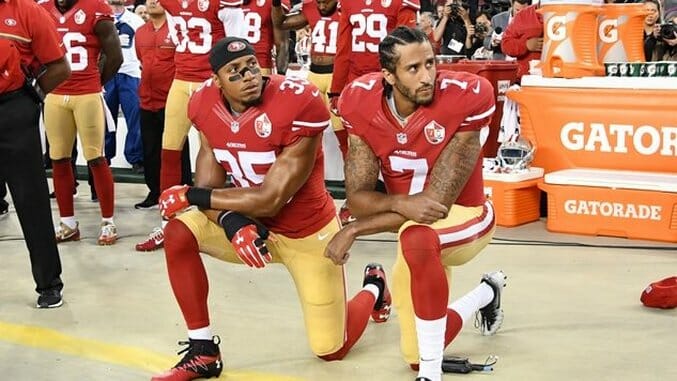Kaepernick’s Protest Is the Tip of the Institutional Racism Iceberg
Photo by Robert Reiners
Some people couldn’t get their heads around Colin Kaepernick’s protest last fall. To many white fans, Kaepernick was living proof that there wasn’t a race problem in football or in America. A black man—with visible tattoos, no less!—succeeding as an NFL quarterback was proof of how tolerant we all were. Instead of expressing his dissatisfaction, he should have been thanking the league, the fans, and America for his fame and fortune.
What’s ironic is that Kaepernick’s situation encapsulates precisely the problem his critics insist doesn’t exist. The forces that he was protesting were always there, but because fans couldn’t see how they affected him, they determined that he just enjoyed whining. Hardly anyone argues that racism has been eradicated from our society, but Kaepernick struck a nerve when he posited that systemic racism still pervades American institutions. Now, an invisible system is working against him, and it goes by the same name as the forces he was calling out in the first place: institutional racism.
Institutional racism is a tricky concept for a lot of people, particularly when it comes to sports, because individual instances of racism are what grab headlines. The powers that be are quick to condemn players for using racial slurs, for example, or to banish those whose racism becomes public. Apologies are made and accepted, resignations are handed in, and the immediate race problem has been solved. There are countless stories of athletes of color who have, whether out of genuine forgiveness or lack of a sensible alternative, accepted the apologies of a colleague or fan for a racist incident and moved on for the good of the game.
It’s much more difficult to detect institutional racism, but a league shouldn’t get a free pass just because it condemns those members whose racism cannot be ignored. Institutional racism is about quiet, pervasive discrimination in the attitude of an institution. Let us examine the prevailing attitude of the NFL when it comes to Kaepernick.
Kaepernick may have peaked early, but he is a gifted quarterback in a league that could use about ten more gifted quarterbacks. The case can and has been made that he is better than several of the 32 QB’s predicted to start next season. He’s certainly better than many of the other free agent playcallers who have been signed this offseason. Even if he doesn’t deserve to start, few teams have a better backup, particularly considering that Kaepernick’s ground game would provide many offenses with an entirely new dimension. Personally, I think even teams with an established starter could benefit from periodically playing him, but that’s a different column. Point is, he’s more than deserving of a spot on a roster, somewhere.
-

-

-

-

-

-

-

-

-

-

-

-

-

-

-

-

-

-

-

-

-

-

-

-

-

-

-

-

-

-

-

-

-

-

-

-

-

-

-

-








































